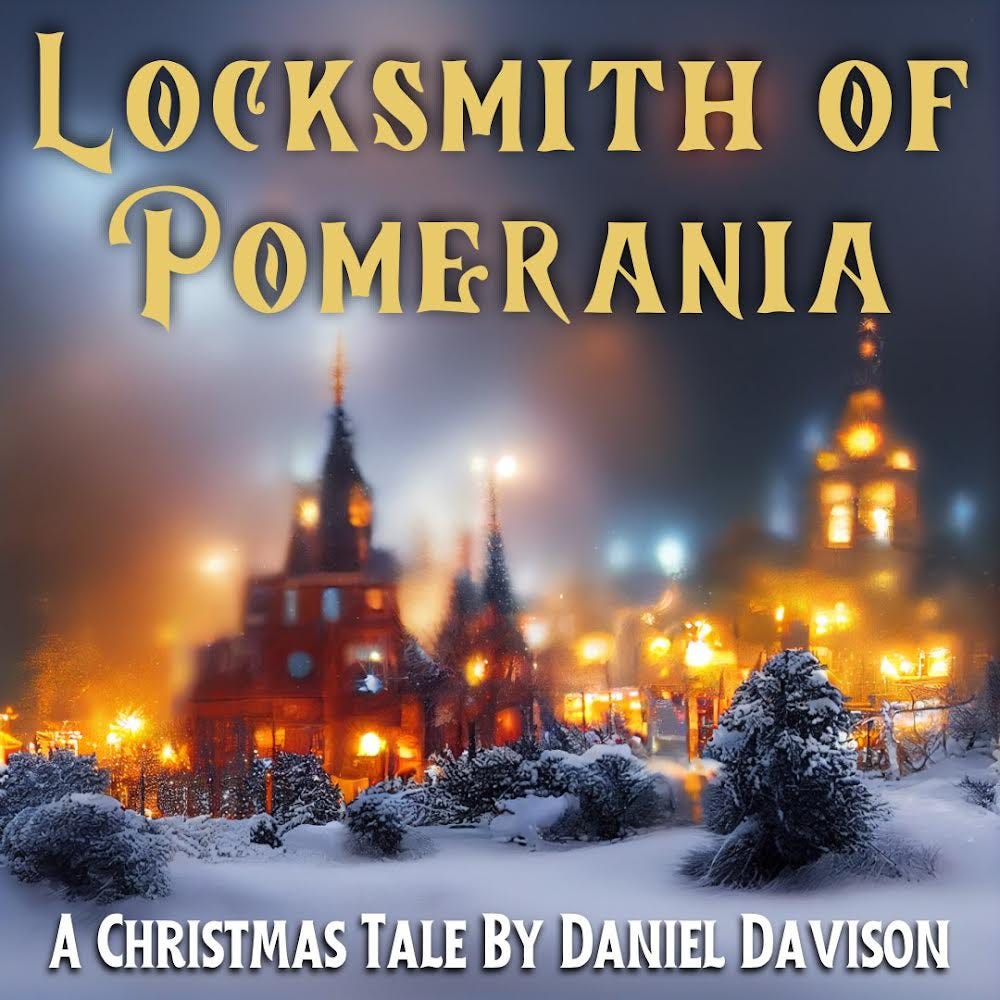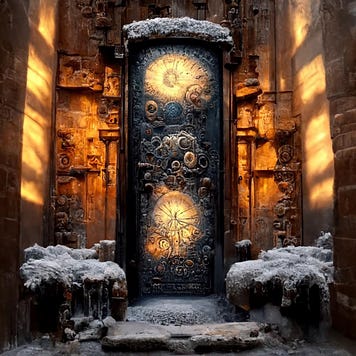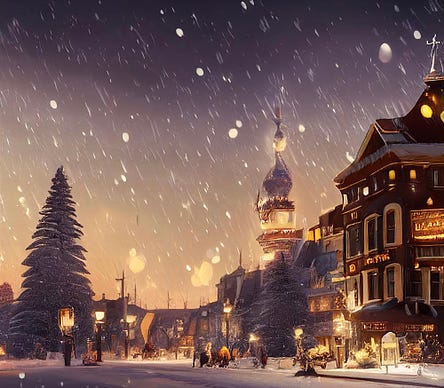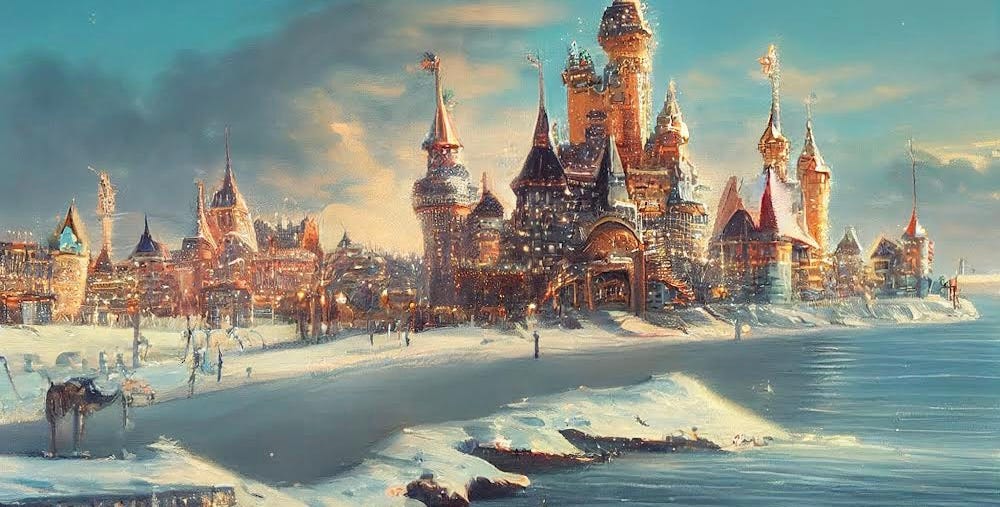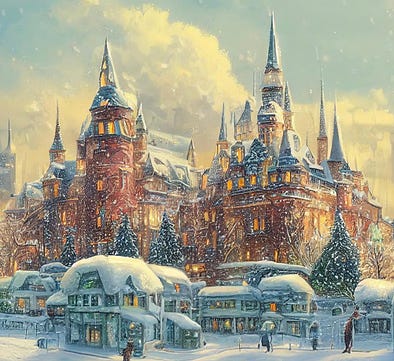The Storyletter - The Locksmith of Pomerania
Once upon a Christmas Eve, a miserly old Prince lay dying in a castle high on a hill over the Pomeranian town of Vollgeschlossen. The old Prince was so tightfisted that even in his extremity the only luxury he afforded himself was a pewter cup of steaming, tasteless broth. The Prince’s son had grown gray serving his father, waiting for the old man to die. He attended to the old man’s every need, standing solicitously beside the canopied four-poster, whose sheets and coverlet had become rancid, moth-eaten, ratty, and frayed. “I doubt you’ll know what to do with your inheritance,” the old Prince said with a knowing grin, “but the treasure is yours, by right and by law.” The miser’s tawny teeth chattered, and it was so cold in the room that his stinking breath could be seen. With trembling fingers, the miser handed his son a heavy iron key. Then he clutched the bedcovers, cried out in agony and died. The miser’s son was now the Prince. He peered down at the key in his hand, whose filigreed handle was shaped like a padlock. Without so much as a prayer over the body of his departed father, he walked briskly from the room and descended the spiral staircase, a score of retainers behind him. They passed through many corridors with high arches, and through many lofty galleries hung with faded portraits. Crossing a bridge that spanned a black chasm, the Prince reached the door of the treasure house. The riches of the realm were his!
Tremblingly he inserted the key into the keyhole and turned it. There was a faint click, then another—and another after that. All at once a hundred latches and wards tumbled into life. The iron studs and fixtures that decorated the door moved kaleidoscopically. Two medallions in front of the Prince snapped open, revealing tin irises and pupils that rolled upward like the eyes of a dying man. Bars of iron spun clockwise and counterclockwise until they settled into a hideous grin. The door groaned on its hinges and opened. A stale exhalation poured forth from the musty room. The Prince removed the key from the keyhole and entered. His retainers followed, torches blazing. Scattered around the cobwebbed chamber were strongboxes stacked neatly on top of one another other, or heaped high up in haphazard disarray. Some were elongated and thin like coffins. Others were small and square-shaped, no larger than a Bible. All were locked. The Prince bent down to the closest chest, which was double-banded. He inserted the key and it clicked open. He raised the lid. It was filled to the brim with iron padlocks, all of which had tiny keyholes—so small that his key could not fit inside them. The Prince ran to another chest and opened it. This one was filled with chains. All throughout the night he opened each and every box. But each and every box contained nothing but padlocks and chains. The Prince fled the treasure room, crossing the bridge over the chasm. He sprinted up the spiral staircase and into his father’s room. He glanced in disgust at the corpse of his dead father, the miser whom he now hated. Stepping out onto the balcony, the Prince looked balefully down at the town of Vollgeschlossen below. The tall-masted ships that plied the sluggish waters of the Baltic Sea were anchored in the town’s harbor, frozen in the winter’s thickening ice. The Prince’s mouth curled in a haughty sneer.
As the cathedral bells rang out on Christmas morning, he raised his voice and said, “If the citizens of this wealthy and prosperous town think so little of their Prince as to keep him in rags and penury, then this Prince shall take his revenge upon them. I shall share my inheritance with this ungrateful folk! The town of Vollgeschlossen shall be shut up, closed, locked up into immobility!” Then he raised his arms and cried out: “Let my curse be borne on the winds and pass from Pomerania over the cold Baltic Sea: The head shall set its locks upon the heart!”
The rattling of the chains of the rising portcullis reverberated in the crisp morning air. The Prince’s men poured from the castle and made their way down the hill, some on horses, some in bulky sleds drawn by reindeer. The sleds were filled with locks, chains, and bolts. The Prince’s men drew a chain across the mouth of the bay; then they secured the chain with bolts to the harbor’s lighthouse. They chained up and locked the ships to the docks, so that after the winter’s thaw they would not be able to leave. They battened down the ships’ hatches and bolted them shut. They locked the doors of the Waaghaus, where the goods were weighed, and the doors of the warehouses, where the goods were stored. They locked up the belfry of the red-brick cathedral. And, to the astonishment of the clergy, they sealed off the entrance of the cathedral too. The Prince’s men dragged the sick, the infirm, the orphans, and the widows from the many-gabled House of Charity. Then they shot the door-bolt through and clapped over it a great iron padlock adorned with the face of a grinning devil. The citizens were evicted from their homes. All the houses were sealed. The Prince’s men bolted shut the windows—and even covered with chains and bolts all of the town’s chimney pots. There were no keys tiny enough to open any of these locks. Then the Prince and his beautiful young daughter withdrew into the castle, which was closed and sealed so completely that not a single aperture was left to look out over the town. He locked up all the gates to town. He locked up all the shops. He even locked the cellars, Where the brewers kept the hops.
“You’ve heard the rhyme,” the man in the fur-trimmed coat and stovepipe hat said to the children standing round him in the town square. They were gathered under the tall oil lamp posts, as the snow fell on the cobbles. The bells of the cathedral rang out in the early night. “The Prince’s father,” the man continued, “may have been stingy, but his son was truly wicked. Why, he was so mean that he even locked up all the kennels and dog houses, so that the little doggies had nowhere to sleep.” “Oh no!” Ilse exclaimed, as the Pomeranian pup at her ankles looked up at her and whimpered. “But the locks are gone now,” a sullen, red-headed boy said, glancing over his shoulder at the castle on the hill. “So something must’ve happened to change all that.” “Patience, my boy, patience. I’m getting to that,” the man said.
All that year the townsfolk lived in discomfort and misery. They slept under tents in the streets. No ships came to harbor, since no ships could get in. No peddlers came to sell their wares. No one could find a way into the town. Weighed down by the wickedness of his ways, the Prince aged rapidly and his face became trenched with wrinkles. He became stricken by palsy. And the bolts around town seemed to deteriorate with him. In no time they’d become rusty and bizarrely swollen.
On the following Christmas Eve, the Prince lay on the same threadbare deathbed that his father had died on the year before. As has been mentioned, the Prince had a young daughter.—Oh, she was so pretty! And was as different from her father as the darkness is from the light. The Princess stood at her father’s bedside and spoon-fed him from a bowl of chicken broth that she herself had seethed.
“I doubt you will know what to do with your inheritance,” the Prince said, sadly, “but the treasure is yours, by right and by law.” He handed her the same iron key that his father had given him the year before. Then he turned away from his daughter in shame and died with a sigh. She kissed her father’s forehead and left the chamber weeping. The Princess descended the spiral staircase and made her way to the bridge over the black chasm. At the door of the treasure room, she inserted the key into the keyhole. The door opened. She entered the cold chamber and surveyed the wooden chests, which were now cracked, broken, upended, and thrown pell-mell all over the stone flags. They were all empty. “What could Papa have meant?” the girl asked herself. “There’s nothing left at all.” The Princess closed the door to the treasure room and locked it once more. She watched as the two iron medallions that looked like eyes closed their lids; and as they did so, small iron studs sank vertically from the medallions like tears. The Princess grieved for her father, because, despite his wickedness, she had loved him dearly. He had never treated her ill. But the Princess also grieved for the unfortunate townsfolk of Vollgeschlossen, her subjects, for she had seen how they suffered— “How had she seen their suffering?” the red-headed boy asked. “What?” the storyteller said. “If the windows of the castle were shut and there were no apertures in the castle to look out of, how had she seen the people’s suffering?” “Why… I’m not sure,” the man said, and touched his chin with a gloved hand. “Oh, now I recall. She could see through the narrow gaps of the shutters.” The boy seemed to accept this answer and nodded. The storyteller nodded too. “That’s exactly what she did.” The Princess had seen their suffering, but there was nothing she could do to help them. The key that her father had given her was useless. It would not open the locks of the tiny keyholes in the town. So she paced through the castle, or, more accurately, through the rooms inside the castle that remained open and accessible to her. And another year passed. The following Christmas, a journeyman locksmith came to town. “If the gates of the town were locked,” the red-headed boy said, “how did he get in?” “Oh, Matthias!” said little Ilse, kneeling down to pick up her puppy. “Shut up and let him tell the story!” But the man in the stovepipe hat was all smiles. “The frost of the previous winter had caused a wide rift to form in the town’s wall. And it was through this rift that the young man entered.” Well, you can imagine how shocked and bewildered the locksmith was by the spectacle that confronted him. The people looked at him with sad, defeated eyes. But when the baker saw the young man wearing the badge of his trade and recognized the tools on his belt, he perked up and said, “It’s a locksmith! He can help us!” “I’m still only a journeyman—an apprentice, you see?” the young man replied. “But I’ll help if I can. What is the problem?” The townsfolk led him up a wide flight of steps to the door of the many-gabled House of Charity. The locksmith’s apprentice bent over and studied the bolt with the grinning devil’s head on it. Then he turned to the townsfolk and scratched his head with a look of utter perplexity. Without so much as using a single lock-picking tool, the young man shattered the lock with his bare fist and it crumbled to the ground. It had become gingerbread! Then he ran down the steps, crossed the town square to the cathedral, and did the same to the lock on the cathedral’s tall doors. When the townsfolk saw this, they cheered and, emboldened by what they had just witnessed, fanned out through the town, breaking the locks one by one in the same manner. They even ate the gingerbread pieces, because they were tasty. Then the chain across the harbor was wound back into the winch, and the gates of the town were opened again.
As the bells of the cathedral rang out on Christmas Day, the portcullis of the castle went up. The courtiers embraced one another in the castle’s halls. A gorgeous sleigh drawn by sixteen milkwhite reindeer descended the path leading down into Vollgeschlossen. When the sleigh arrived in the town square, the citizens doffed their caps, bowed their heads, and knelt out of respect for the Princess. The Princess alighted from the sleigh with one hand on her breast. She begged her subjects to rise. Then the Burgomaster informed her that the locksmith had saved them all. The young man stood in front of the Princess, abashed. He didn’t know how to act or what to say. He’d never been in the presence of royalty before. The Princess smiled and praised him for the unique skill and ingenuity that he had used in saving the town. “How did you do it?” she asked and blushed. For in truth the locksmith was a handsome young lad. “It was neither skill nor ingenuity, my Lady,” the young man said quietly and shrugged. “I’m merely a locksmith. I work with iron—with bolts and with locks. But when the head sets its locks upon the heart, the locks work only so long as the heart believes in them.” Amid wild jubilation, the Locksmith of Pomerania was hoisted onto the shoulders of the burghers and tradesmen, who paraded him through the streets of the town. And on the following Easter, the Princess and the young man were married… And they lived happily ever after.
“And that,” said the man, pointing to the town’s crest carved over the Rathaus door, “is why our town’s coat-of-arms is a heart with a keyhole in the middle of it. And it is why the town of Vollgeschlossen is famed for its gingerbread cookies, made each year at Christmas time, in the shapes of padlocks, hearts, and keys.” Then the man in the stovepipe hat, who also happened to be the Head of the Right Honorable Guild of Locksmiths, led the children to a hut at the edge of the Christmas market, where an old woman was selling gingerbread cookies. The man gave the woman a silver thaler. Then he handed a cookie to each of the children, including the red-headed rapscallion Mathias, who thanked him and laughed. There were even a few crumbs left for Ilse’s Pomeranian pup, who yapped and wheeled excitedly around the children’s feet.
The End
|
Older messages
Storyletter Thoughts: What steps have you taken to write like a boss? How do you feel about deadlines?
Thursday, December 8, 2022
Being an independent author is a lot like running a small business. You're in charge of every aspect of the process, such as writing, research, …
The Fuller
Sunday, December 4, 2022
Short Story by JM Elliott | Historical Fantasy | S6 Contest Winner
To Build a Website
Thursday, December 1, 2022
XPress Access | November
Winter Wind
Sunday, November 27, 2022
Poem | Fantasy
(SRA) The Shooting of Dan McGrew by Robert W. Service
Thursday, November 24, 2022
Listen now (7 min) | Audio Series Episode 13
You Might Also Like
*This* Is How To Wear Skinny Jeans Like A Fashion Girl In 2025
Wednesday, March 12, 2025
The revival is here. The Zoe Report Daily The Zoe Report 3.11.2025 This Is How To Wear Skinny Jeans Like A Fashion Girl In 2025 (Style) This Is How To Wear Skinny Jeans Like A Fashion Girl In 2025 The
The Best Thing: March 11, 2025
Tuesday, March 11, 2025
The Best Thing is our weekly discussion thread where we share the one thing that we read, listened to, watched, did, or otherwise enjoyed recent… ͏ ͏ ͏ ͏ ͏ ͏ ͏ ͏ ͏ ͏ ͏ ͏ ͏ ͏ ͏ ͏ ͏ ͏ ͏ ͏ ͏ ͏ ͏ ͏ ͏ ͏ ͏ ͏
The Most Groundbreaking Beauty Products Of 2025 Are...
Tuesday, March 11, 2025
Brands are prioritizing innovation more than ever. The Zoe Report Beauty The Zoe Report 3.11.2025 (Beauty) The 2025 TZR Beauty Groundbreakers Awards (Your New Holy Grail Or Two) The 2025 TZR Beauty
Change Up #Legday With One of These Squat Variations
Tuesday, March 11, 2025
View in Browser Men's Health SHOP MVP EXCLUSIVES SUBSCRIBE Change Up #Legday With One of These Squat Variations Change Up #Legday With One of These Squat Variations The lower body staple is one of
Kylie Jenner Wore The Spiciest Plunging Crop Top While Kissing Timothée Chalamet
Tuesday, March 11, 2025
Plus, Amanda Seyfried opens up about her busy year, your daily horoscope, and more. Mar. 11, 2025 Bustle Daily Amanda Seyfried at the Tory Burch Fall RTW 2025 fashion show as part of New York Fashion
Paris Fashion Week Is Getting Interesting Again
Tuesday, March 11, 2025
Today in style, self, culture, and power. The Cut March 11, 2025 PARIS FASHION WEEK Fashion Is Getting Interesting Again Designs at Paris Fashion Week once again reflect the times with new aesthetics,
Your dinner table deserves to be lazier
Tuesday, March 11, 2025
NY delis are serving 'Bird Flu Bailout' sandwiches.
Sophie Thatcher Lets In The Light
Tuesday, March 11, 2025
Plus: Chet Hanks reaches new heights on Netflix's 'Running Point.' • Mar. 11, 2025 Up Next Your complete guide to industry-shaping entertainment news, exclusive interviews with A-list
Mastering Circumstance
Tuesday, March 11, 2025
“If a man does not master his circumstances then he is bound to be mastered by them.” ͏ ͏ ͏ ͏ ͏ ͏ ͏ ͏ ͏ ͏ ͏ ͏ ͏ ͏ ͏ ͏ ͏ ͏ ͏ ͏ ͏ ͏ ͏ ͏ ͏ ͏ ͏ ͏ ͏ ͏ ͏ ͏ ͏ ͏ ͏ ͏ ͏ ͏ ͏ ͏ ͏ ͏ ͏ ͏ ͏ ͏ ͏ ͏ ͏ ͏ ͏ ͏ ͏ ͏ ͏ ͏ ͏ ͏
Don't Fall for This Parking Fee Scam Text 🚨
Tuesday, March 11, 2025
How I Use the 'One in, One Out' Method for My Finances. You're not facing any fines. Not displaying correctly? View this newsletter online. TODAY'S FEATURED STORY Don't Fall for the
